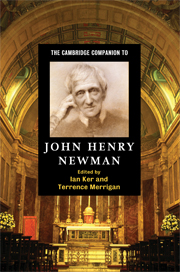8 - Infallibility
Published online by Cambridge University Press: 28 May 2009
Summary
For John Henry Newman, the difference between the infallibility of the Church and that of the pope, and between the claim of the one and the other on his act of faith, was no merely academic question. It was a very real issue that affected a great part of his life. Even as an Anglican, as we shall see, he believed that the Church enjoyed infallibility; but it was only some months after the definition by Vatican I that he could give his full assent to papal infallibility as a dogma of his faith. Our treatment of infallibility then falls into two parts, presenting first Newman's views on the infallibility of the Church, and second his views on papal infallibility. / The infallibility of the church / We begin with what Newman believed concerning the infallibility of the Church while still an Anglican. He expressed his mind on this most explicitly in the eighth of his Lectures on the Prophetical Office of the Church, entitled 'The Indefectibility of the Church Catholic'. The main purpose Newman had in these lectures was to describe Anglicanism - in what he saw as its most authentic tradition, if not in actuality - as the via media between the deficiencies of Protestantism and the excesses of Roman Catholicism. The defect of Protestantism was its failure to recognize the need of a visible Church equipped with a 'prophetical office' to safeguard the purity of the apostolic faith against the errors inevitable in the exercise of private judgement on Scripture as a sole rule of faith. The excess of Romanism was its claim to possess an abiding and pervasive infallibility that would allow it to create new dogmas practically at will.
- Type
- Chapter
- Information
- The Cambridge Companion to John Henry Newman , pp. 156 - 169Publisher: Cambridge University PressPrint publication year: 2009
- 1
- Cited by



